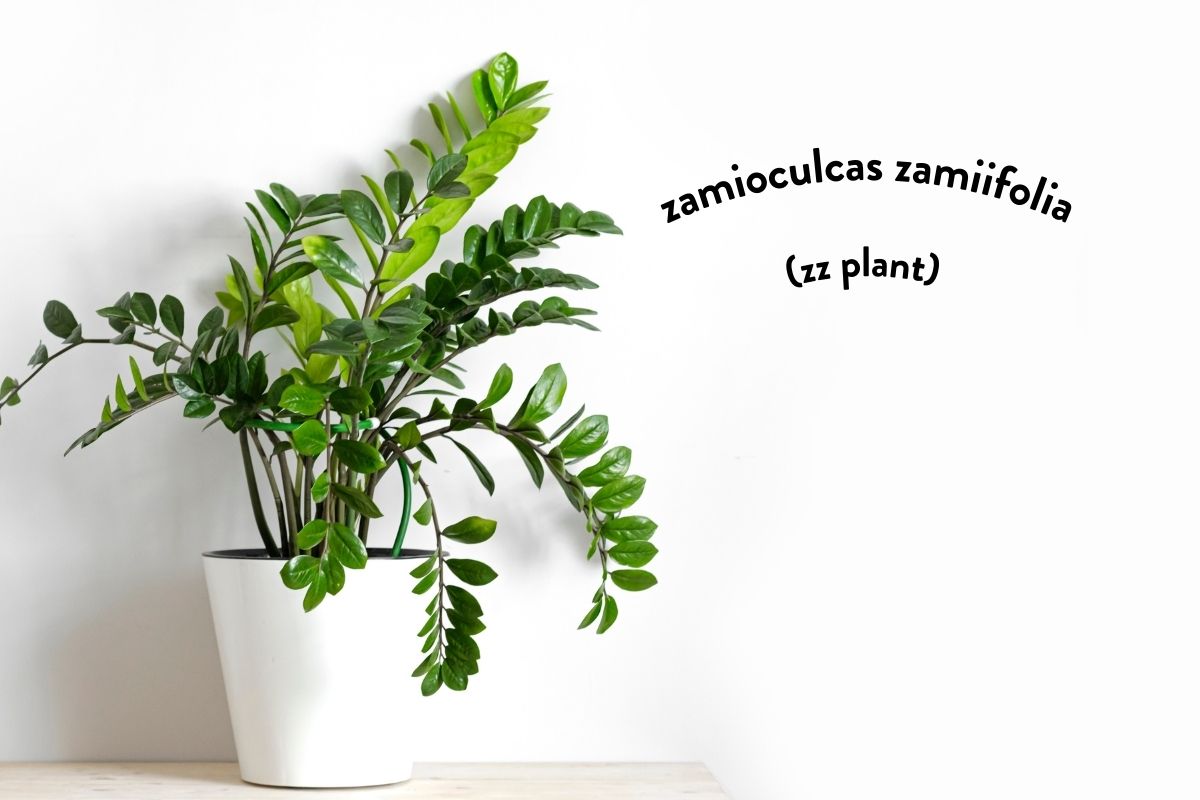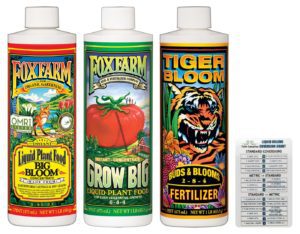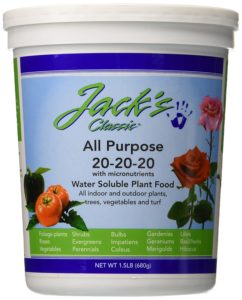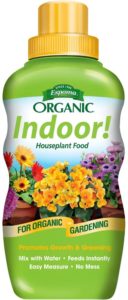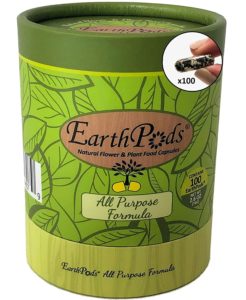ZZ stands for Zamioculcas zamiifolia, which is a tropical plant that originates from South Africa. It can also be found under the name Zanzibar gem or Emerald palm because of its shiny emerald leaves. This plant has been around for centuries and thrives outdoors even in the case of drought.
It is a really easy plant to propagate, which is why it is one of the most popular indoor plants around the world.
The ZZ plant is one you will find all over people’s offices & homes, because of its strong, dark green leaves & easy care regime. ZZ plants can thrive in low light and with little water, and only grow to a width of two to three feet tall.
The magic of this exotic houseplant is that it is an air purifier and removes toxins from the air that you breathe, according to a NASA study. It only grows to a height of two to three feet tall so you can keep it in the same pot as it will not outgrow its container.
everything you need to know about zz plant fertilizer
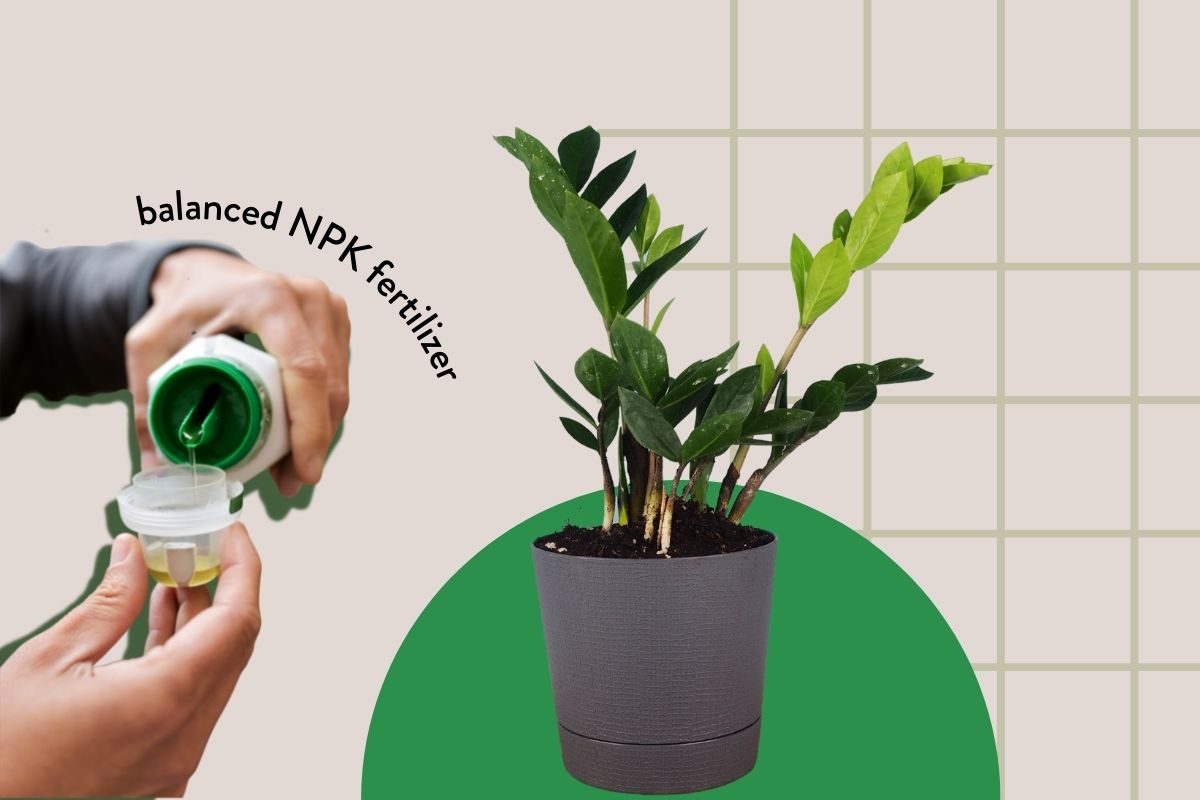
Since they aren’t living out in nature, and are able to receive their nutrients and minerals directly from the earth or from rainwater, most indoor plants will need fertilizing. Potting soil usually comes with nutrients, but they are quickly depleted and consumed by your plant after a couple of months, which is why you still need to fertilize your zz plant.
ZZs should be fertilized with a balanced 10-10-10 or 20-20-20 liquid fertilizer. It is super important to fertilize them with a balanced fertilizer so they live longer and happier. Using natural fertilizers will help your zz plant grow faster. It’s not necessary to use a specific potting mix for the zz plant, any well-drained potting soil will be enough to keep them satisfied.
I really like the FoxFarm liquid fertilizer trio pack because it has fertilizer ratios for a few different plant types and growing periods.
Give your zz plants a balanced liquid fertilizer once a month when watering during their growing season, which lasts from spring to fall. Always dilute your fertilizer to half the recommended strength for the first couple of months in case of it being too strong for your plant (which could damage its leaves and root system.)
To clear up any confusion, fertilizer is not ‘food’ for your plants, an organic fertilizer is like vitamins for your plant to help encourage them to grow larger and stronger.
how to choose the right fertilizer for your zz plant
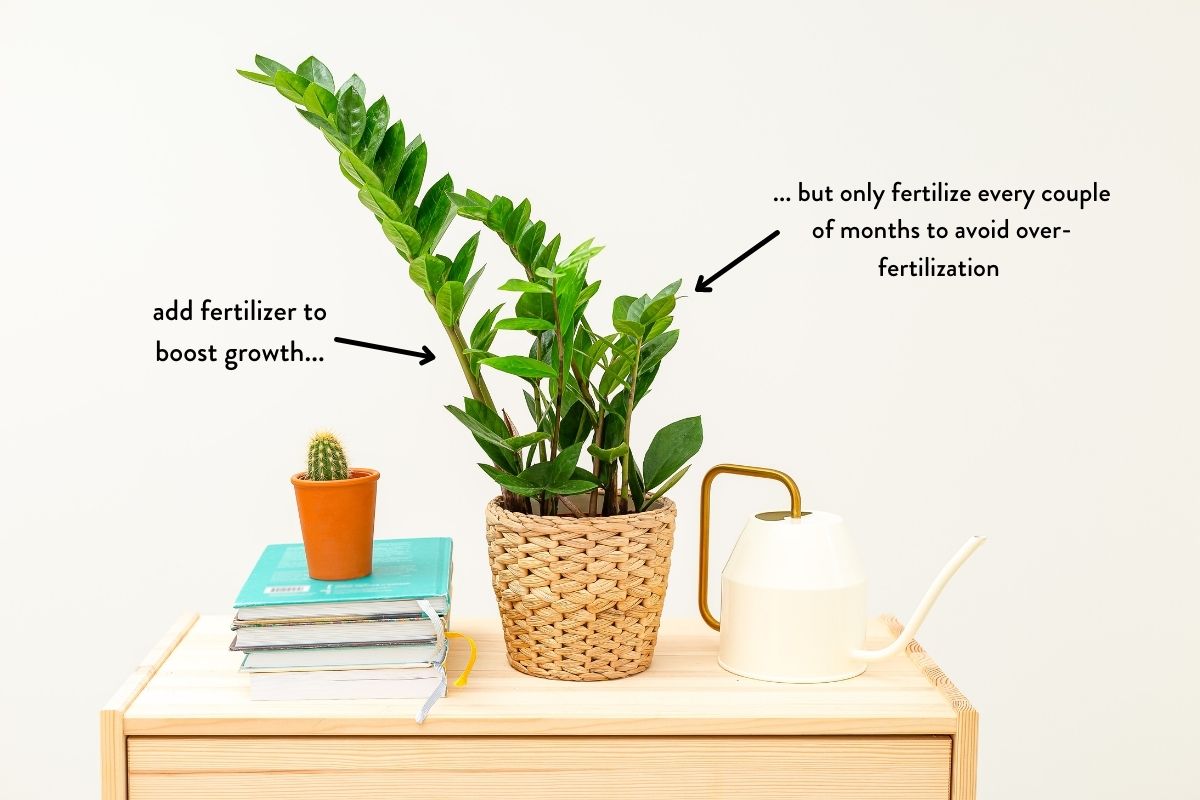
Fertilizing should be simple right? First, you will just need to know a little bit about what goes into a fertilizer, what the ratios mean, and be aware of the risks of too much fertilizer on your plant.
fertilizer Ingredients
Most organic fertilizers contain nitrogen, phosphorus and potassium. These are the main and most important ingredients required for healthy growth in plants. Nitrogen helps promote the leafy green growth on the leaves & stems. Phosphorus encourages the root structure and flowers or blooms. Potassium helps with plant growth and prevents disease. Other times you can find fertilizers with macronutrients including calcium, magnesium, and sulfur (which are not as necessary for the plants to thrive.)
All these ingredients will give your plants the nutrients for new growth, healthy roots, leaves and more.
fertilizer ratio
N-P-K stands for nitrogen, phosphorus and potassium. You will usually see the ratio written on the front of most fertilizer bottles.
For ZZ plants, you want to look for a balanced fertilizer that has a ratio of 20-20-20 or 10-10-10, which would mean it has 10% of nitrogen, 10% phosphorus and 10% potassium. (Potassium is represented by the letter K, its elemental symbol in the periodic table.)
Since ZZ plants have a lot of leafy growth and a sensitive root system that could be disrupted by the wrong amount of nutrients or overwatering, the best is a balanced ratio.
overfertilization
It is possible to over-fertilize your plants which would cause damage to your ZZ’s foliage. If you over-fertilize, the damaged leaves will turn brown or yellow and the roots may as well be damaged. This is not-so-affectionally called fertilizer burn.
Try to avoid fertilizing during the winter months, and dilute your fertilizer to half strength. If you see any of these indicators of fertilizer burn, just water your plant and let the nutrients flush out of the soil. Let the soil dry out completely before you water again.
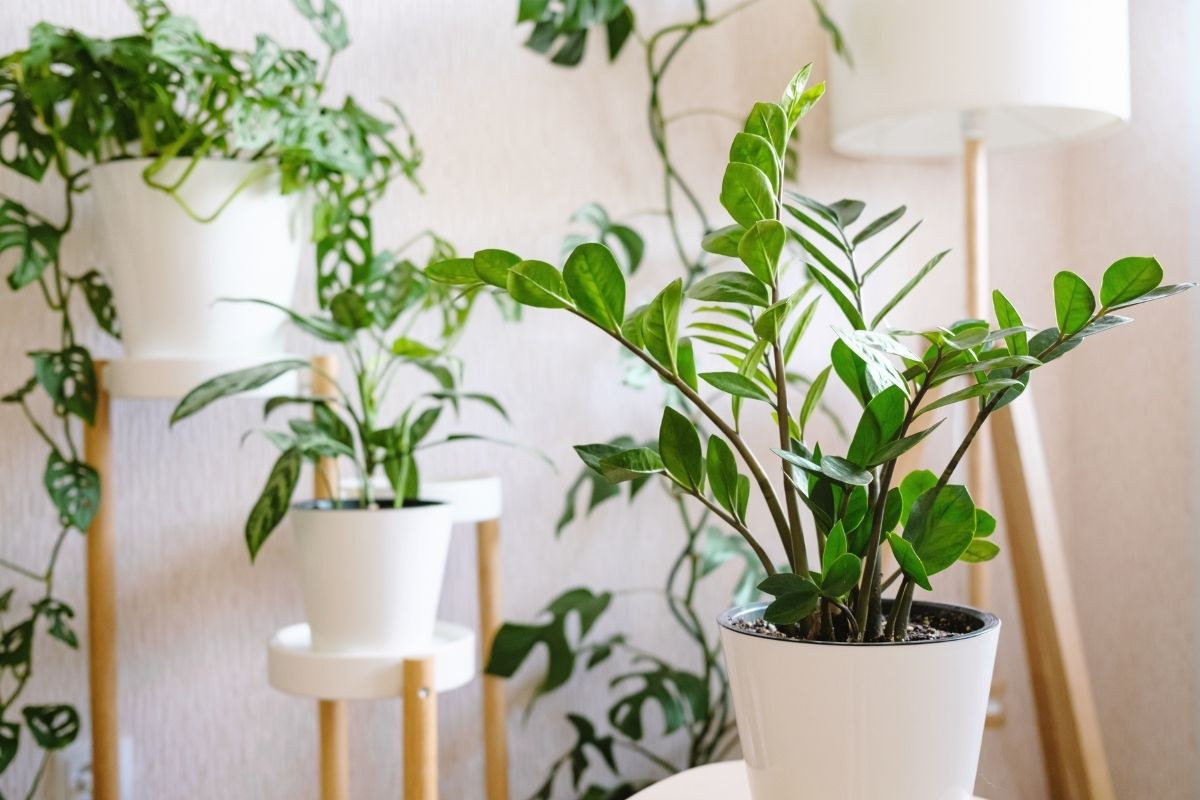
recommended fertilizers for ZZ plants
This fertilizer gives you the balanced ratio of 20-20-20 and is water soluble. It contains other micronutrients and is perfect for keeping the leaves of your plant leafy and green. This fertilizer will last you a super long time, as you can even dilute it to a quarter of its strength and it will still be efficient.
This one has a ratio of 2-2-2 and is completely balanced and full of organic nutrients for your ZZ houseplant to grow healthy & strong.
EarthPods Organic Indoor Plant Food
This concentrated all-premium organic plant food supports your plant’s root growth, strong stem development, enhances its leaf color vibrancy, and enriches the soil of your plants. These fertilizer capsules are pre-measured and contain 100 pods which can last for up to 5 years just for one houseplant! Just push the pod all the way into the soil close to the roots, and it will slowly break down and release the nutrients over time.
different type of fertilizers for zz plants
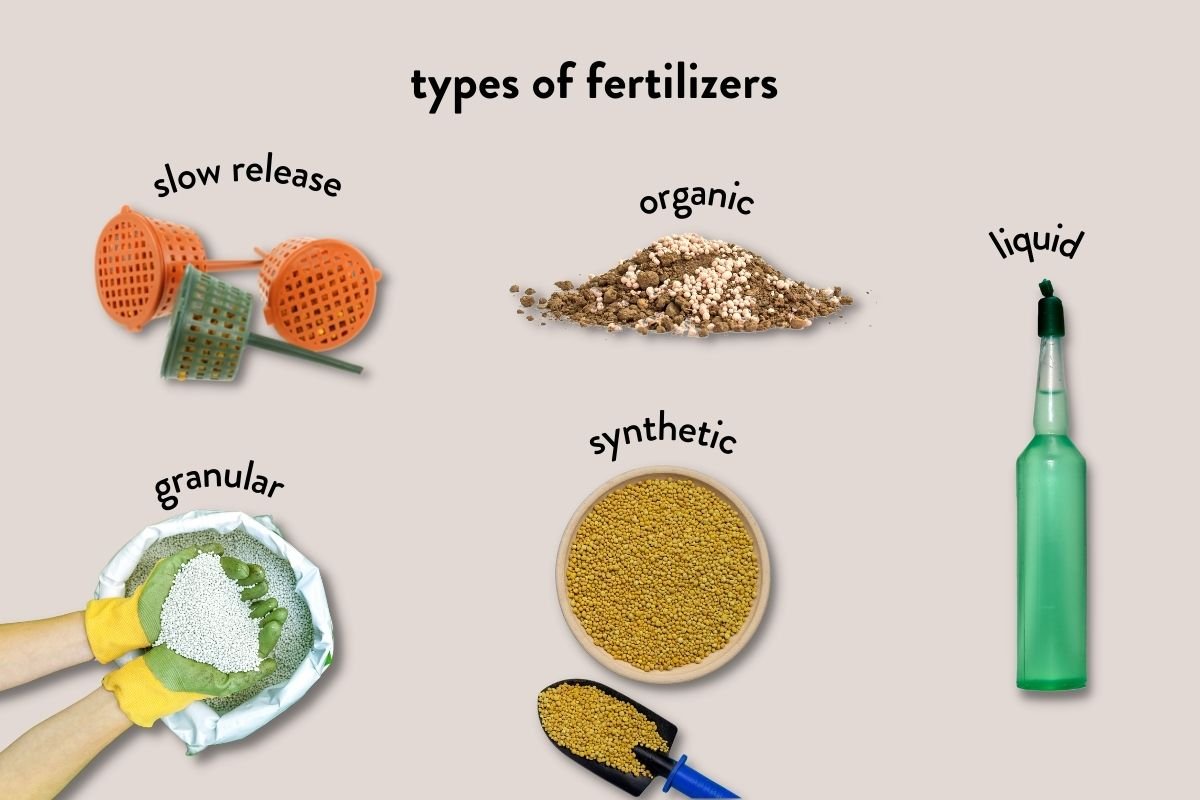
You have to decide what kind of fertilizer you want to use for your zz plant and from there you can choose the best fit, without it being too complicated.
We will go through the different options for you and share what fertilizers are the best for your zz plant depending on whatever growing period they are in.
liquid fertilizers
This is one of the most practical options, as you have the options to dilute liquid fertilizers and control their strength. They usually come in powdered or liquid form, and are mixed in with water.
granular fertilizers
Granular fertilizers are pellets that are sprinkled on top of the soil in your pot, or pushed into the soil. You can use a garden fork to gently mix them into the soil. Water your plant well to activate the granules in the soil. They are more often used for outdoor gardens, but can work for house plants as well.
slow release fertilizers
These ones also come in granules or pellets that slowly release over time. All you have to do is put them in your plant’s soil, and let the formula work it’s magic. It’s kinda similar to the magic beans in the Jack & the Beanstalk story. As you water your plant, these nutrients will be dispersed into the soil and last for a few months. The only downside is you cannot control the strength of the fertilizer, which means you could risk accidentally burning your plant.
organic fertilizers
Organic means that the soil is completely made with natural materials and has no pesticides or chemicals in the mixture. It is usually more expensive, and since the ingredients are not processed, it takes your plant a little bit more time to fully absorb the mixture as it will break down in the soil over time.
synthetic fertilizers
Synthetic fertilizers are pretty self-explanatory, they are made up of synthetic minerals and chemicals that are already processed and ready for plant uptake. They are a lot cheaper and more concentrated than organic fertilizers. You will need to dilute it with water before feeding your zz plant.
It totally depends on you and the amount of time you have to spend taking care of your plant. If you want a more-cost effective and easier way, a synthetic fertilizer is the way to go. If you really are a plant lover and able to notice all the subtle signs of over-fertilizing before your plant is damaged, you can try a completely organic, general liquid fertilizer.
FAQs
how often should I fertilize my ZZ plant?
You can fertilize every month or two, from spring to fall. During the winter, plants go dormant and their growth is slowed down, so they don’t need to be fertilized. Never fertilize during the winter as your plant can get burned.
do ZZ plants need fertilizer?
Yes! Pretty much all houseplants need fertilizer, but zz plants like a fertilizer with a balanced N-P-K ratio. All plants need fertilizer to stay happy, healthy and growing for many years to come.
how do I boost my ZZ plant?
You can add compost or fertilizer to boost the growth. Other tips including leaving your ZZ plant in indirect light, and making sure to get rid of excess water from the pot.
do ZZ plants like coffee grounds?
Unfortunately, coffee grounds are not a good fertilizer for zz plants, as they will end up creating water retention which can lead to root rot. If you want to make your own organic home-made fertilizer, you can try making a compost or seaweed tea. You can also apply aquarium water directly to your plant, as it will contain a high amount of nutrients including nitrogen.
More about fertilizing
- 10 Best Worm Composter Bins For Easy Homemade Compost
- Compost Starter 101: When You Need It And How To Make It
- Our top pothos fertilizer picks for luscious vines
- 5 reasons to use coffee as fertilizer for your plants
- Best fertilizer for Monstera plants for gorgeous leaves
- Fertilizer Burn on Plants? Here’s How to Fix it
- Fiddle leaf fig fertilizer: How to feed your fiddle leaf

